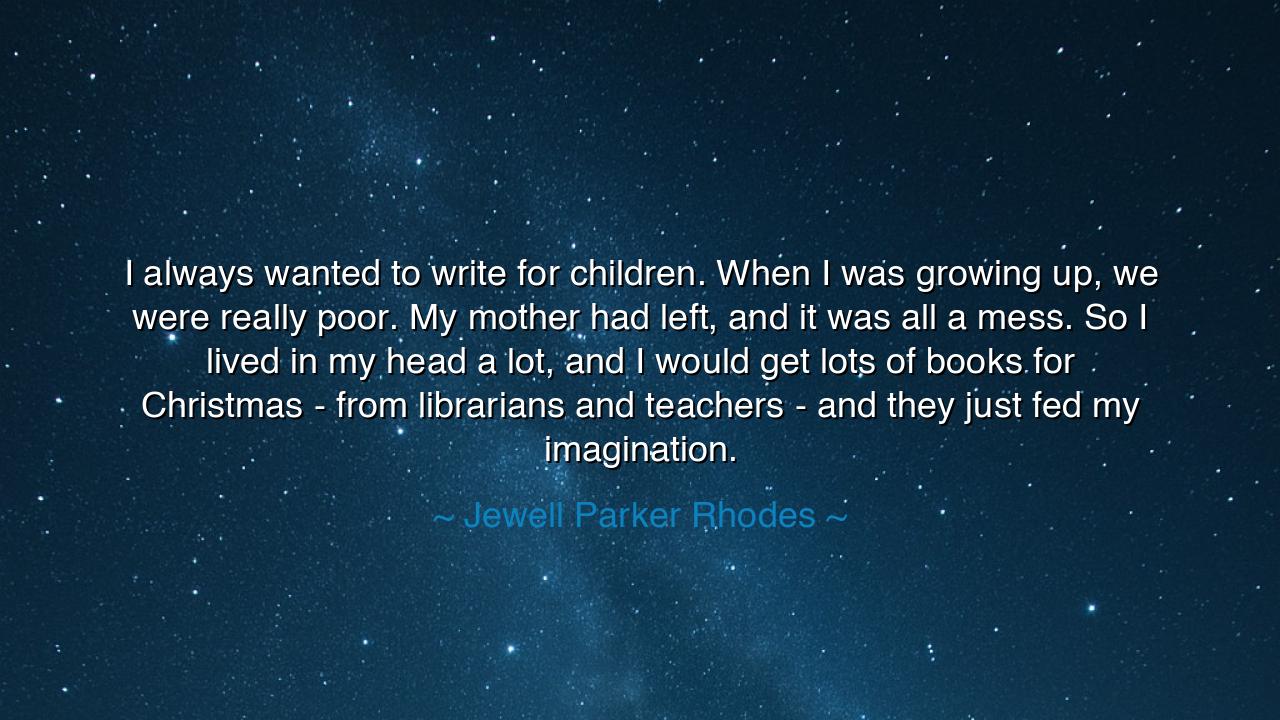
I always wanted to write for children. When I was growing up, we
I always wanted to write for children. When I was growing up, we were really poor. My mother had left, and it was all a mess. So I lived in my head a lot, and I would get lots of books for Christmas - from librarians and teachers - and they just fed my imagination.






Host: The room was bathed in a soft evening glow, the shadows growing longer as the world outside slowed down. The hum of distant traffic was barely audible, creating a peaceful atmosphere inside. Jack sat at the table, his fingers absently turning the pages of a book, while Jeeny stood near the window, her arms folded, her gaze focused on the darkening horizon. The words of Jewell Parker Rhodes lingered between them, a quiet invitation to reflect on the power of imagination and the escape that books can provide.
Jeeny: “I was thinking about this quote from Jewell Parker Rhodes: ‘I always wanted to write for children. When I was growing up, we were really poor. My mother had left, and it was all a mess. So I lived in my head a lot, and I would get lots of books for Christmas—from librarians and teachers—and they just fed my imagination.’ It’s such a powerful way of describing how books can become more than just a form of entertainment—they can be a lifeline, a way out of difficult circumstances.”
Jack: “It’s remarkable, isn’t it? The way books have this power to transport us, to offer an escape when life is overwhelming. For Rhodes, books were not just stories—they were a refuge. When everything around her was falling apart, books became the place where she could go, where her imagination could thrive. That’s a kind of magic, don’t you think? To find a world where you can exist outside your circumstances.”
Jeeny: “Yes, exactly. For her, books weren’t just an escape—they were a way to nurture her creativity, her imagination, when life didn’t offer much else. I think a lot of writers come from a similar place, don’t they? The desire to write, to create, is often born from those moments of solitude or difficulty. When you don’t have the world to give you what you need, you find a way to give it to yourself, and for Rhodes, that meant creating and consuming stories.”
Host: The room felt quieter now, the weight of Jeeny’s words hanging between them. Jack’s eyes moved from the book in his lap to Jeeny, his expression thoughtful, as if he was beginning to see the deeper layers of what Rhodes was saying.
Jack: “It makes me wonder how many people have found their passion or their calling in times of hardship, like Rhodes did. She found a way to transform pain and difficulty into something creative, into something beautiful. It’s like she was given a gift through books—not just a way to escape, but a way to grow, to find meaning in the world around her, even when things seemed bleak.”
Jeeny: “I think that’s the real power of stories, don’t you? They give us a way to process life, to make sense of the things we can’t control. Rhodes used her pain to fuel her creativity. And now, she writes for children, maybe to give them that same gift—something that nurtures their imagination, something that offers them an escape when they need it most, just like it did for her.”
Jack: “So, it’s like books—stories—become a kind of medicine, a way to heal, even when the circumstances aren’t ideal. It’s not just about entertainment, it’s about growth, nourishment, and hope. For Rhodes, reading wasn’t just a distraction from her reality—it was a way to shape her future, to find a path when everything seemed uncertain.”
Jeeny: “Exactly. Books give children something powerful: a chance to dream, to imagine different possibilities, to see themselves in new ways. And for someone like Rhodes, it wasn’t just about escaping her reality—it was about creating the tools she needed to understand and transform it. She wanted to offer that same gift to the next generation. To show them that no matter what their circumstances are, they have the power to shape their own worlds.”
Host: The stillness in the room seemed to deepen, the idea of books as more than just stories—a tool for transformation, for healing—settling like a quiet truth between them. Jack sat back in his chair, his fingers resting on the edge of his cup, contemplating the idea that books are not just things we read, but things that can shape our lives, our dreams, and our futures.
Jack: “It’s incredible to think about how stories can shape us, guide us. They can be the thing that gives us hope, that helps us imagine something better, something brighter. And when you think about it, writers like Rhodes are giving back what they received. They’re passing the torch, offering that same escape, that same opportunity for growth.”
Jeeny: “Yes, and it’s a cycle, isn’t it? The stories we read as children become the stories we tell, the stories we write. Rhodes didn’t just receive the gift of books—she gave it back. She’s creating stories that will shape another generation, just as hers were shaped. It’s a way of continuing that nurturing, that care.”
Host: The conversation had settled into a quiet understanding, the realization that stories—whether through reading or writing—have the power to transform, to heal, and to guide. Jewell Parker Rhodes, in her journey from hardship to creativity, found solace in books, and now, through her writing, she was offering that same gift to others. In a world full of challenges, books became the bridge between pain and possibility, between what is and what could be.






AAdministratorAdministrator
Welcome, honored guests. Please leave a comment, we will respond soon